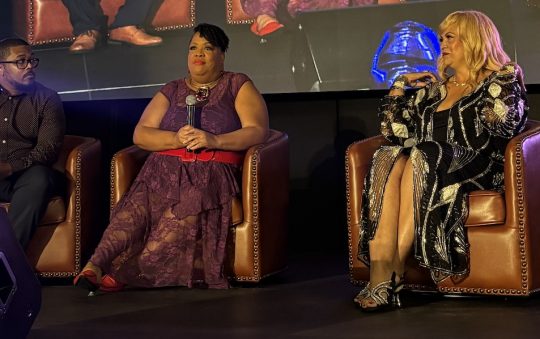
For Alana Kay Bright, storytelling was a lifeline long before it was a career. Growing up in San Antonio, TX and Houston, she created entire worlds out of her dolls-, but not in the typical manner of a young child’s pseudo-ventriloquism.
Instead, she captured stop-motion animations with her grandpa’s camera and edited them on his old computer. While other kids played, Alana was quietly stitching together the building blocks of a creative future, immersing herself in projects that gave her a sense of purpose, peace, and escape.
That passion carried her into theater, where she reversed the role and stepped into the front-facing aspect of filmmaking. Her breakout role as Nikki Vaughn in Our Kind of People, filmed in Wilmington, North Carolina, was a defining moment. Surrounded by an all-Black cast, Alana felt seen and nurtured in ways she hadn’t before. “I had a Black makeup artist and a Black hairstylist. Everybody was Black! The entire experience gave me the best, but most unrealistic expectation of the industry,” she shared.
Related Links:
https://lasentinel.net/swim-to-me-30-years-of-making-waves-in-los-angeles.html
https://lasentinel.net/the-heroes-of-the-2024-taste-of-soul.html
“It was the most about-the-art experience I could’ve had,” she recalled. “I wasn’t questioning my identity. I was just working, going home, and connecting deeply with my castmates,” she reminisced, also acknowledging that if it were filmed in Los Angeles, she might have had a very different experience. The six months of filming proved to be grounding, reaffirming the power of authenticity and collaboration.
That breakout role was the product of a fortuitous, early-pandemic era scroll through social media. She stumbled upon an open casting call from Tony winner Laura Benanti, who wanted to create an at-home musical. During this process, the project took on an additional shape: a documentary film. HBO Max released this film, entitled “Homeschool Musical: Class of 2020,” shortly thereafter. That opportunity became her springboard, connecting her with agents and representatives who watered her growing career. With the opportunity with “Our Kind of People” within her grasp, Alana left USC and temporarily moved to North Carolina.
Her warm welcome back to Los Angeles was, unfortunately, thwarted by the beginning of the writer’s strike. Not dwelling on what she could not change, Alana looked for new ways to create and engage her imagination, while also vacillating on changing her major at USC. She began to re-explore the backroads of filmmaking through creating her first short film, “Wine West.” Inspired by Victoria Monét’s “Party Girls” music video, the project cemented within her another calling: filmmaking.
“It all just called me outside of my will,” she said. “I was really close in auditions for a big role. Then in an [acting] coaching session, [the coach] was like, ‘you go to USC, right?’ Through that film, I realized I was at the best film school in the world. I had no idea.” Immediately, Alana submitted “Wine West” as an internal transfer from USC’s School of Dramatic Arts to the School of Cinematic Arts.
Music, too, has become a canvas on which her soul can express itself. Her most recent single, “Leaves in Georgia “(2024), is a love letter to her great-grandmother, Mama Honey, who lived with her family for a decade.
“I got to live with her [when she was] 93 to 103. She shaped so much of my womanhood and integrity. I felt that people didn’t know me until they met her,” Alana recalled.
The song, inspired by a trip through Georgia, represents a moment when she stood with her great-grandmother under the foliage; under the leaves in Georgia. Looking up, the moment reframed the haunting reality that her Mama Honey experienced of trees being symbols of and weapons for death, into something healing and sacred. The song is a story of roots, resilience, and finding beauty in pain.
Navigating multiple creative paths as an acting, filmmaking, music-making Black woman hasn’t been simple. “People want you to be palatable, to fit into neat boxes,” she admitted. But Alana refuses to shrink herself. Whether acting, writer, directing, or making music, she’s committed to claiming space and telling stories that matter.
As for the heart of her journey, it’s the people who believe in her. “Thank you to my producer Jayvidd, my good friend Preston Peace for the guitar loop—the heart of the song—and my best friend Ari, who listened to it a sickening amount of times and reassured me every step of the way.”
From crafting tiny, imagined worlds as a child to shaping the real ones she inhabits now, Alana Kay Bright reminds us that true artistry doesn’t have to fall into one perfectly marketable box. For her, the story doesn’t truly begin until she’s stepped past the edge of a boundary, into the endless unknown where her creativity thrives.






